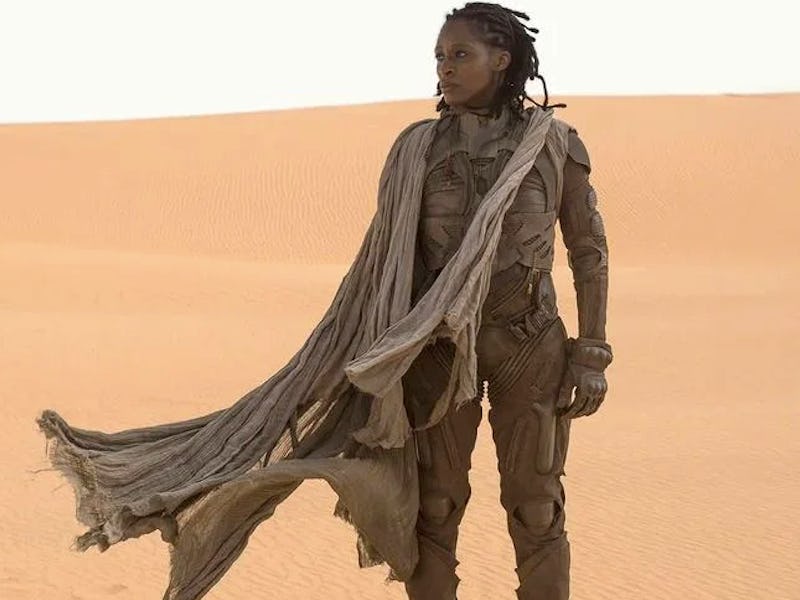Dune 2020 casting may have spoiled an ambitious sequel vision
One big decision is more layered than it seems.

The biggest change in Denis Villeneuve's adaptation of Dune that we know about yet is the casting of Sharon Duncan-Brewster as Liet-Kynes. In all existing live-action versions of Dune, prior to the new film, Liet-Kynes was played by a man; Max von Sydow in the 1984 Dune and Karel Dobrý in the Sci-Fi Channel 2000 miniseries. But, now, Liet-Kynes will be a Black woman.
This change is great for a lot of reasons, with the most obvious one being that an all-white Dune would be not only problematic but boring as hell. But, the cool thing about Sharon Duncan-Brewster playing Liet-Kynes is that this casting also means she has a connection with another character (and actor) in the cast that only hardcore Dune heads have thought about. Here's why Sharon Duncan-Brewster as Liet-Kynes is more pivotal than you think, and which character she's linked to in the novel. Spoilers ahead for the novel Dune. Speculation follows.
We want to hear from you! Take the ultimate Rick and Morty survey now.
The true identity of Liet-Kynes isn't the biggest spoiler in Dune, and that's mostly because the novel telegraphs the twist about a mile away. When House Atrides is tasked with taking control of Arrakis from the Harkonnens, they quickly learn that they need to become allies with the native Fremen who live in the deep desert of the planet.
Here's the latest trailer for Dune, if you need a refresher.
The Fremen follow a mysterious person called Liet, which, early in the book, Stilgar mentions is a person who "serves two masters." At the same time, Duke Leto is supposed to meet with a local Emperor-appointed ecologist named Dr. Kynes, someone who is familiar with the Fremen, but who works as a liaison to the larger government.
It's not a huge revelation that Liet and Kynes are secretly the same person, and considering you already know the character is named Liet-Kynes, all I've really done here is explained the hyphen. But, the "spoiler" isn't what's interesting about this character. Liet-Kynes is cool because they exist politically, in two places. One of the biggest themes of Dune is the idea that Paul must become an uniter. Liet-Kynes is the person who best epitomizes the duality and diversity of that potential unity.
But, the slightly bigger spoiler here is that in the book, Liet-Kynes is the father of Chani, the Fremen woman who Paul dreams about before he meets her. In the 1984 Dune, Chani was played by Sean Young, but in the new movie, she'll be played by Zendaya. Because Chani is actually Chani Kynes, this means that Sharon Duncan-Brewster is playing Zendaya's mom in the movie, even though this has not been explicitly stated.
Now, it's possible that Liet-Kynes will not be the parent of Chani in this adaptation, though that seems unlikely. Liet-Kynes is such an important character that an entire section in the Dune appendices (the first appendix actually!) is devoted to the history of Liet-Kynes' father, Pardot Kynes, who was the first planetologist of Arrakis. The history of Pardot is important, too, because they are the character who puts into motion the notion that Arrakis' basic environment could be altered over time. After Pardot dies, Liet-Kynes takes over that work.
Liet-Kynes makes this possible.
Liet-Kynes, in almost every way, is the most pivotal character in Dune. They impact change on a large, political scale, but also on a smaller, personal scale by being the mother of the heroic Chani. This also means that Liet-Kynes is the eventual grandparent of Chani and Paul's son, Leto II. If the first Dune movie leads to sequels, that means we'll eventually see Leto II as a grown man, and then, as the entity known as the God-Emperor of Dune. Without Liet-Kynes, none of it can happen. Sharon Duncan-Brewster isn't playing a random character that was easy to recast as a Black person and a woman. This character creates the Dune story with powerful actions. If we're just at the beginning of a new Dune series, the impact of Duncan-Brewster as Liet-Kynes will likely be much bigger than you expect.
Dune comes to theaters December 18, 2020.